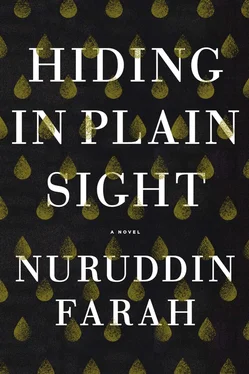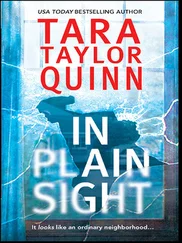“Do I understand that you have your father’s computers’ passwords at your fingertips?” she asks Salif with care.
“Have they found his computers?”
“Please don’t answer my question with another,” she reprimands him gently.
“I’m sorry,” he says. “I do.”
“Every single one of them?”
“Every single one of them.”
She looks at Salif, as if with a new pair of eyes, and sees Aar in him vividly now: astute, caring, trustworthy, levelheaded, with an unerring sense of what matters. It’s the first time she has understood the meaning of the saying, “The child is father to the man.” She prays she can aspire to achieve a fraction of what her brother achieved as a single parent.
—
Mahdi is waiting for them in the doorway. He hugs Bella warmly, his whole body trembling, his tears flowing freely. Bella hasn’t had a cry since her encounter with Gunilla, but now she gives in to the impulse again. Salif doesn’t permit himself to get carried away, however, giving Mahdi only a brief hug and muttering, “Yes, we’ll miss him terribly,” in response to Mahdi’s outpouring. “You’re a big, grown man yourself,” he concludes, sizing Salif up. “You’re your own man. But I want you to know we are here for you.” He turns to Bella. “We could have picked them up, you know.”
“I did not think to ask,” Bella says. “Besides, you have your own worries.” She wants to let him know that she has an idea about Fatima’s state of health even though this is not the right time to discuss it, and she can see that he is touched by the delicate way she has let him know. He takes Bella’s hand in his left and offers his free one to Salif, and the three of them enter the house.
“We’ve been grieving, following the loss,” Mahdi says, as if standing here where Aar so often stood has brought him back even more vividly. “He was our great friend, and no commiseration or sorrowing words spoken will replace him. Nor am I fond of the words of condolence we Somalis often invoke — that we are all headed in the same direction, toward our graves. That’s no consolation. Me, I don’t like this kind of talk.”
It is these words that at last bring tears to Salif’s eyes, and he moves to embrace Mahdi, but just at that moment, Mahdi turns and shouts up the stairs for Zubair to come join them. Zubair careens down the stairs, Dahaba with him, and the young fellow offers his formal condolence, hugging Bella and then standing apart, head bowed and looking sad. But as soon as they have satisfied the demands of politeness, Zubair and Dahaba bound back up the stairs to reenter the world of the young, where sorrow is held at bay for as long as possible.
Mahdi says, “Where are my manners? Please forgive me.” Bella doesn’t quite comprehend why he says this. Not until he turns to her and asks, “What will you have?”
“Tea is fine, if that is no bother, thanks.”
They follow him into the kitchen. Bella sits as he pours water, but Salif, who has brought his camera, wants to take photos of them, and he asks them to pose for him, his first photo of two adults outside his home.
Mahdi insists on seeing the camera before posing, and after receiving it, he admires it. “Nice camera, must be expensive.” Then he asks, “Where did you get it, I never knew you had such a beautiful camera?”
“A gift from Auntie Bella,” says Salif.
“Well, well, a grand camera for a lucky boy.”
“She got one for Dahaba too.”
“But that is wonderful.”
Bella listens in silence, happily beaming.
Mahdi and Bella obligingly pose for Salif and he takes a couple of photos just to be sure, and then goes upstairs to join the others, a fresh spring in his gait and a broad, joyful smile covering his features.
The two adults are now alone in the kitchen. Mahdi brings out a tray and teacups and the ubiquitous UHT milk and sugar. Bella notices that his hands are shaking, and wonders if he is very, very sad not only about Aar’s early tortured death but also about Fatima’s cancer.
Mahdi says, “When a country like ours goes to ruin, it takes our best too.” He sighs. “We go back a long way. Your mother taught me at the law faculty, Aar was a schoolmate of Fatima’s. His name was on every girl’s lips, but he took very little notice of any of them because he was hardworking, always thinking about schoolwork, competitive, the best in everything, soccer, chess, games, you name it. Later, at the university, they went to different faculties, he to economics, she to agriculture, but they still kept in touch and we reconnected when they both graduated and he came to our wedding and then he often visited our home for the odd meal. We would tease him about women and Fatima even tried to set him up with one of her girlfriends. Not interested. Fatima would say Aar was meant for greater things, certain that he would do well at whatever he set his mind on, for he was talking of doing his PhD. Then I was in political trouble, the dictator threatening me with prison, and we left Somalia. Then came the civil war and we lost touch, but we were happy to reunite with him here. You were much too young for all this.”
“I remember Fatima,” says Bella. “Her beautiful dresses above all. I recall these bright dresses with great envy as a young thing, touching, feeling with my hands the material they were made from. She would bring me marzipans and I would follow her and Aar to the door as they left, hoping they would take me with them wherever they were going.”
“We loved him,” says Mahdi.
“My memories of those days are still with me and they remain sweet in my mouth and I feel as though I can taste their ambrosial residues,” says Bella. “I too was sweet on my brother, as were many other girls.”
“We loved him and now hold you and his children very dear.”
Even though they are standing apart, it is as though, with their reminiscences of Aar safe in their memory, Bella and Mahdi are wrapped in a single cloth woven out of their sorrows. And they fall silent, neither wanting to add to what has been said.
Then the sudden entrance of a cat startles them out of their stupor. The cat rubs against Mahdi’s legs, and then Bella’s, meowing. Then they both hear a key turning in the lock and see Qamar barging in, excitedly lugging a huge shopping bag too heavy to lift. Fatima brings up the rear, admonishing her, “Do be careful, my sweet.” Then she catches sight of Bella and, the door still open, the key still in her hand, she exclaims, “Oh my God, I had no idea.” Fatima sweeps her up in an embrace, her joy at the sight of Bella quickly giving way to fresh grief over Aar, but not before Bella takes in the headscarf that Fatima has on, the first Bella has seen her wearing, the headscarf meant to hide Fatima’s loss of hair from a combination of chemo and related treatment. Also, Fatima’s skin looks pallid, with a worrying patchiness, which Bella associates with the taking of drugs. Bella’s own sorrow grows more acute with the awareness of this new sadness, and it is doubly painful to be able to speak of the one but not the other.
Qamar is waiting patiently for them to finish their hugging before offering her own commiserations to Auntie Bella. Fatima, noticing this, gradually releases Bella from the tightness of her embrace. “My sincere condolences, Auntie,” Qamar whispers.
Bella says, “Oh, my sweetness, thank you.”
“We must stay strong,” Mahdi says.
Bella says, “Thanks for all your support.”
“What else is there to do, what else to say?” says Fatima.
There is a serious struggle all round and Bella is unable to stay on her feet, struck afresh by the reality of Fatima’s illness, and she sits down, exhausted. Mahdi, Fatima, and Qamar surround her, watching in perturbed silence until Mahdi gestures to the others to give her space.
Читать дальше












